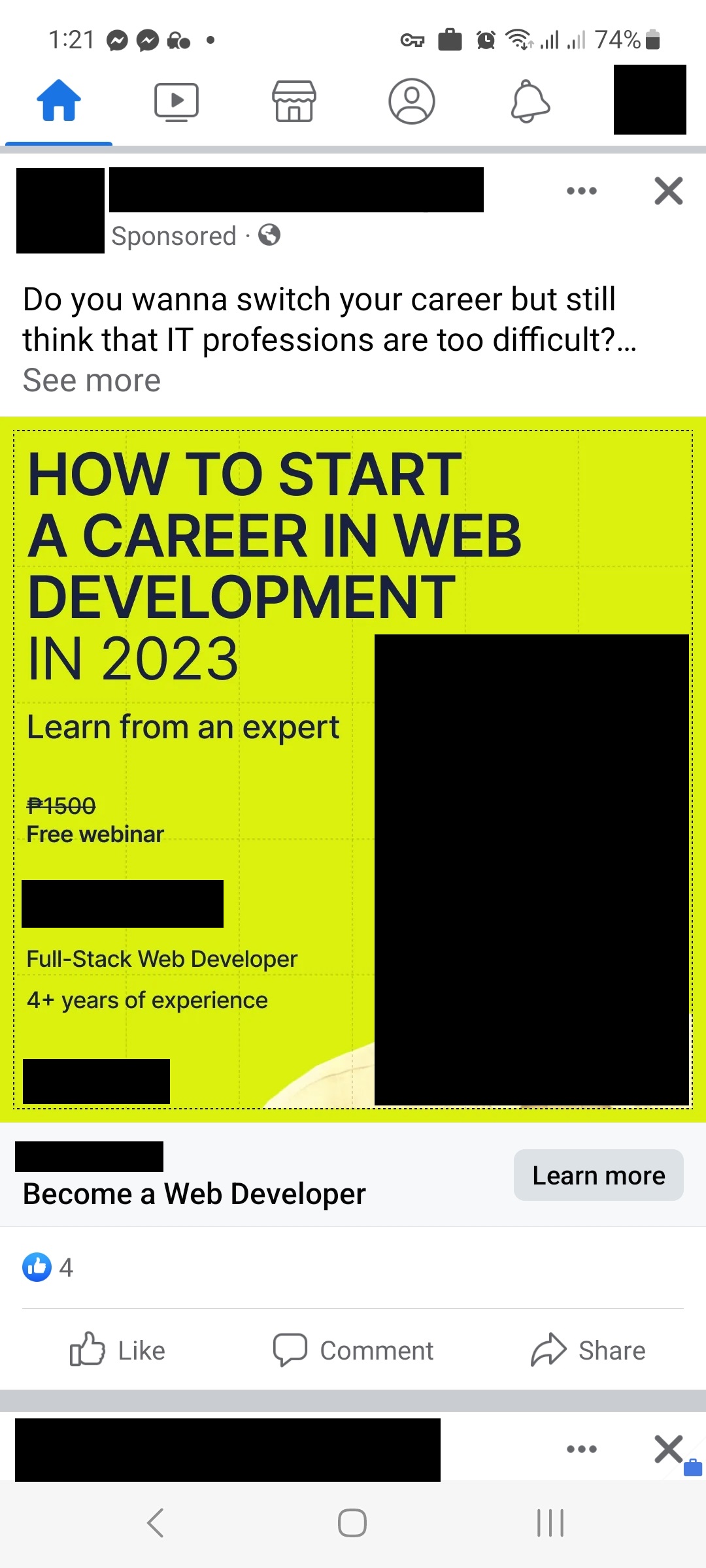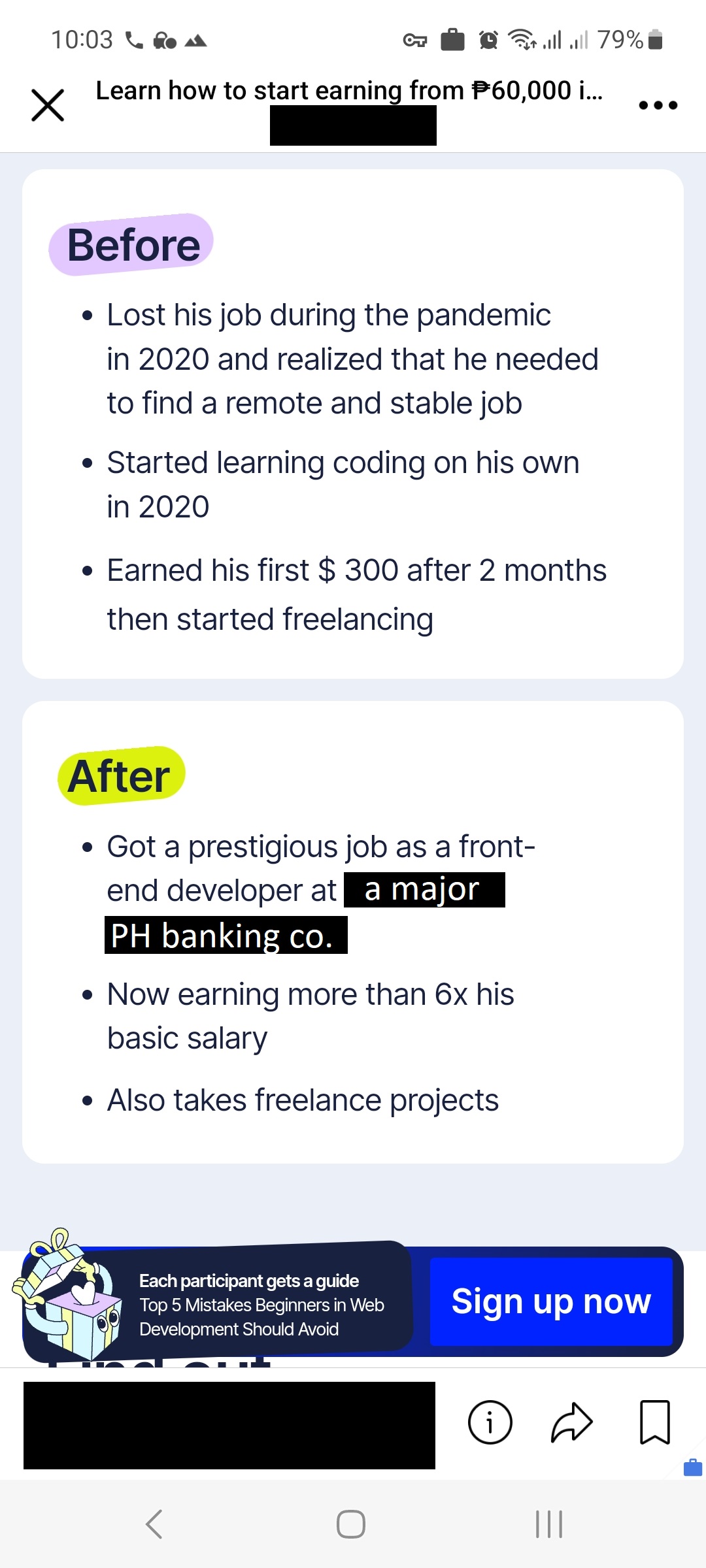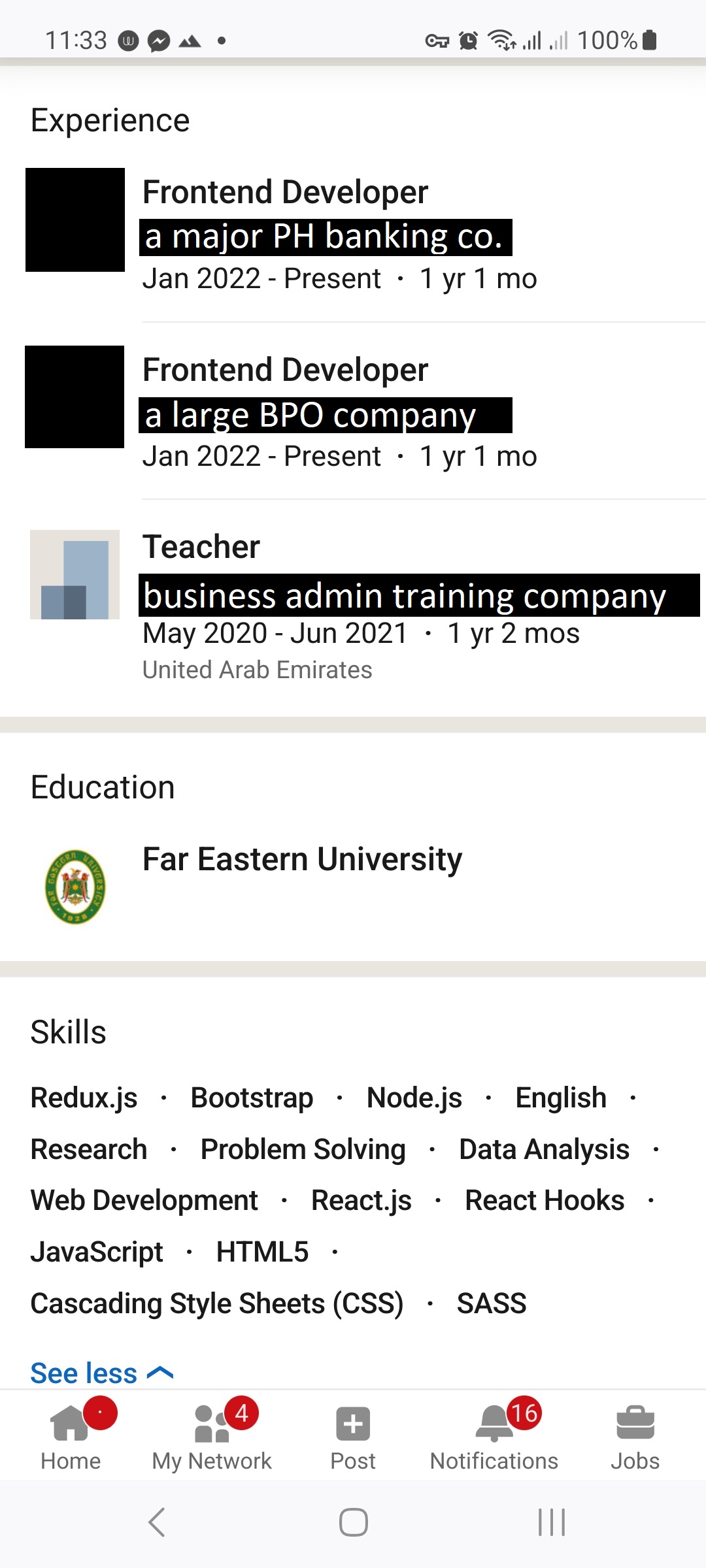I was trolling around Facebook one day during my break time when I stumbled upon a certain ad online. It was an ad for a free webinar on how to start a career in web development. It was supposedly no big deal since I see ads like this on my feed all the time. I mean, it’s just one of those targeted ads that you see on social media. I’m a software developer writing about software development. So this is understandable and should not be a cause for concern.
What got my attention, however, was the statement “learn from an expert.” I got curious. So I read everything that’s in the ad. Well… I’ll just show you the screenshot.

It says here that he’s a full-stack web developer. That’s fine and dandy. But it says here that he’s got 4+ years of experience.
Now, correct me if I’m wrong. But I don’t think a person with 4+ years of experience can be considered an expert especially when you’re in the IT industry. I’ve been in this industry for more than a decade. I can’t even consider myself an expert in .NET development, let alone an expert in full-stack development in general.
So many questions popped up in my head. I wanted to know if that much experience is all you need to be able to consider yourself an expert. I wanted to know if he’s legit. I wanted to know if this is something that I, an “elder” in this industry so to speak, should be worried about. I know I should not concern myself with other people’s BS. But as a person who went through all the trouble before I even got into my position now, I know that one bad piece of advice can kill someone’s career.
So I started with their website. I looked into his career profile there. I suppose whatever is in there, he approved. It’s got his name and picture after all. I only took a screenshot of his career profile for brevity.

The first thing I noticed was the statement, “started learning coding on his own in 2020.” Now I’m not good at math. Back in college, I had to take up calculus again in a summer class and I barely passed on other math subjects. But I know that 2020 up to 2023 is not more than 3 years.
I get that some people have to oversell certain things on their résumé to get hired. But when you sell yourself as an “expert”, your credentials are put to a higher standard and greater scrutiny. As an expert, you’re expected to have collected enough creds to present to people that you’re a credible source of information. At that point, you don’t even have to oversell anything.
This is not going well. But I still want to look for a redeeming factor.
The next thing that got my attention was, “got a prestigious job as a front-end developer at <a major banking company in the Philippines>.” That’s all fine and good, except it’s also said in the profile that he “also takes freelance projects.” I’m not sure what their working arrangement in the bank is. But I don’t think an institution such as <a major banking company in the Philippines> would let their developers work for a different client without their discretion.
First of all, moonlighting is grounds for termination from certain companies. Now I don’t know if their contract has a moonlighting or a non-compete clause. But even without those, I believe <a major banking company in the Philippines> understands the concept of “conflict of interest.”
If you’re a bank, you hold a lot of trade secrets and other important information. With that said, a bank should be very particular about its employees’ dealings, especially when the employee is involved in software development, regardless of whether that developer is front-end, back-end, or full-stack. In other words, they shouldn’t let their developers work for other companies since these other companies he works for might have a conflict of interest. But that’s just me. This is all speculation and should be taken with a grain of salt.
This is just getting worse. At the time, I thought I needed to look for other things to redeem the situation, hopefully. So I kept digging.
My final destination was the guy’s LinkedIn. I was so desperate at this point that all I wanted was an explanation of how he could call himself an expert considering he only learned coding in 2020. I was thinking of the possibilities.
Maybe he called himself an expert after reaching the 10,000th hour of him writing code? Certain people said you become an expert after doing something for 10,000 hours. Maybe that’s it?
Or maybe, he’s just more studious than a lot of developers? Maybe he’s got certifications? Those are things you just flaunt around and I believe it’s virtually impossible for someone not to post those certifications on their LinkedIn. I know I won’t be able to resist the urge to post those certs if I have any.
Or no, if I can get an explanation on how he got to the 4+ years of experience, then I might let this slide. I just can’t fathom how a person with initially zero coding knowledge, who only learned how to code fairly recently, can consider himself an expert.

Oh, lawd… even if I combine these numbers, it won’t even amount to 4 years. Mind you, 2 of his experiences started at around the same time. Now one might argue that he did not include his freelance experience in his profile. With that, I would like to ask, why? Any expert would know that any related work is considered experience. He’s not building a good case here by not including his freelance work. He does not even have to mention the names of the companies he worked for in his time as a freelancer. I know this because I also worked as a freelance developer back in the day. The only reason I removed my freelance work from my profile is that I already worked for a lot of companies and I want to highlight those. But in any case, even with the freelance work included, that still won’t amount to 4 years.
I might seem to be nitpicking here. But he needs to at least prove that he’s got 4+ years of related work experience. This world is in short supply of good teachers, we’re short of reliable sources of information, and a lot of unqualified people with access to the internet talk like they know everything. If we don’t put our experts to a higher standard, who knows what kind of damage that might cause to our future professionals? It’s all fun and games until somebody ruins their career just because someone gave the wrong advice. I know this for a fact because it happened to me. I listened to the wrong people and now it took me 12 years just to reach this point, a position that you can reach in about 5-7 years. But that’s a story for another day.
Actually, this thing reminds me of a certain topic that I really want to write about for the longest time now. I just didn’t know how to start. But I guess this is a good time to write about it. It is about the “fake it till you make it” mindset.
“Fake it till you make it” is one of those “positivity” mindsets that some people with high aspirations apply these days. It’s about acting like you understand the concept of something you don’t fully understand. It’s about having that position of power that you haven’t reached yet and acting like you’re already in it. It’s visualizing the success that you want in life and living in it as if you already got it.
Everybody wants to be successful. But I believe acting like you’re somebody you’re not will not help that cause.
First of all, it promotes distrust. Ideally speaking, companies look for professionals, not smooth-talking grifters. You probably can smooth talk your way to employment. But the real challenge is not in the hiring process. The real challenge starts when you’re given your first project. As with anything, skipping the fundamentals is a recipe for disaster. If your colleagues (and your bosses) see that you’re unqualified for the job, they would lose their trust in you. You would be a bottleneck in your client’s operations, and nobody likes a bottleneck. Worse comes to worst, you will be fired in a matter of weeks or months and the word about your incompetence will spread all throughout the community. If you have enough self-awareness, this is not a fun experience since people will probably talk smack about you behind your back. Normally, that would be uncalled for. But in that case, I can’t blame them for talking shit about you if you’re not being sincere about your capabilities (or lack thereof). They don’t trust you because you lied to them first.
Secondly, it hinders growth. One possibility is it might give you a false assurance that you have everything you need to grow your career. After all, why would you make an effort to improve when you’re already the successful person that you want to be? If that’s not the cause of your stunted career growth, it’s probably because you’re too busy building that facade and proving to people that you’re the person you want them to see. As a person who also was a teenager at some point in my life, I know for a fact that pretending you’re someone you’re not would eat up your time, energy, and resources. It’s a tiring process that does not really help you in any way. All you get is unneeded attention and fake friends. But I digress.
Finally, faking it till you make it may not give you the satisfaction that you’re looking for. People tend to easily neglect things they did not work hard for. You will never experience the joy of hard work. If you have enough self-awareness, impostor syndrome will definitely haunt the living daylights out of you, because at the back of your head, you know for a fact that you’re not as good as you want people to believe, and contrary to the impostor syndrome real people experience where they only doubt the adequacy of their skills, you know in your heart that you’re in fact lacking since you faked your way to success. But that’s not all. You’ll be so busy hiding your insecurities that you might become argumentative and may appear to be a know-it-all. It’s a normal response to any idea that questions or threatens a person’s belief system. Since your success is nothing but a belief, a simple idea contrary to your belief would shake you to your core.
“Fake it till you make it” is not worth it. It’s tiring and wasteful exercise. So what can we do instead? Well, a lot of things. But let’s focus on a few very important things.
To start, you need to acknowledge what you are and what you currently know and don’t know. Acceptance is one of the most important, if not the most important, parts of success. You have to recognize who you are, what you are, and what your capabilities are. It will help you understand your current situation and what needs to be improved to help you reach your goals.
Find joy in what you are and what you have right now. One reason why “fake it till you make it” exists is that people are very unhappy about themselves. They can never find happiness in their lives. I honestly can’t blame them. This world is a terrible place to live in. That’s why I said that we need to find joy, not happiness.
Happiness is a fragile idea and is not easy to define. But joy is simpler and you can find joy in small things. You can be joyful about waking up again. You can be joyful about smelling coffee in the morning. Heck, you can be joyful about having the ability to smell! Joy is much more grounded in reality compared to happiness. When you’re joyful about something, it’s not hard to feel grateful, and when you’re grateful, it’s hard not to feel good.
Once you accept who you are, what you can and cannot do, and you feel good about yourself, make a list of things that you want to improve about yourself. It might be a certain skill that you want to learn to be able to improve your career. It might be a simple practice of greeting your coworkers every day. It doesn’t matter how simple or complicated that thing is. Just write it down.
After listing them down, pick the one you want to work on first. Don’t make your life miserable by doing more than one at a time. We need to build good habits, and the only way to build good habits is to make sure that we can do the right thing on a regular basis. It doesn’t matter if you fail one time. That’s the thing about true success. It’s not easy and you have to do things the hard way sometimes. But what’s important is we never give up. As Will Durant mentioned, “We are what we repeatedly do. Excellence, then, is not an act, but a habit.”
Finally, as you’re working on your success and even after you reach that success, stay humble. Speak when you know what you’re talking about. Stay quiet and listen when a more knowledgeable person talks. Don’t act as if you know more than you actually know. Speak slowly, and clearly, and listen carefully. Accept criticisms and listen to corrections. Learn from criticisms and corrections. Don’t mind those people you see online or in person acting all high and mighty. Let them make asses out of themselves. That’s not your problem.
There is a fine line between positivity and delusion. If your positivity is grounded in reality, you know you’re on the right track.
Bien is a software engineer for more than 10 years, focusing on Microsoft .NET technology. He developed solutions ranging from embedded systems to accounting systems. He spends his free time trying to understand the world and its people.
